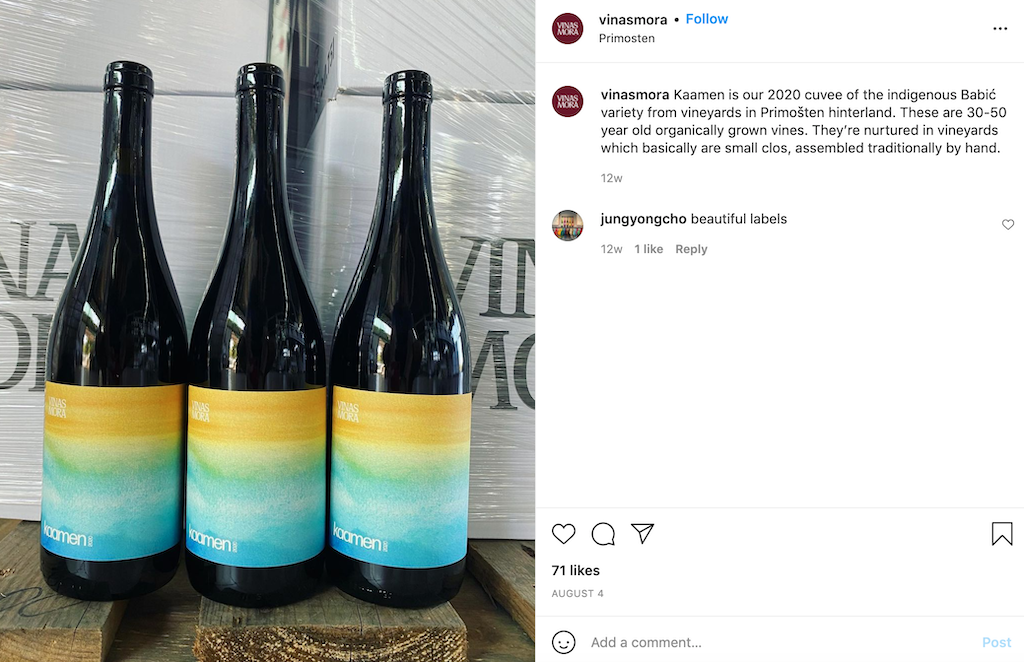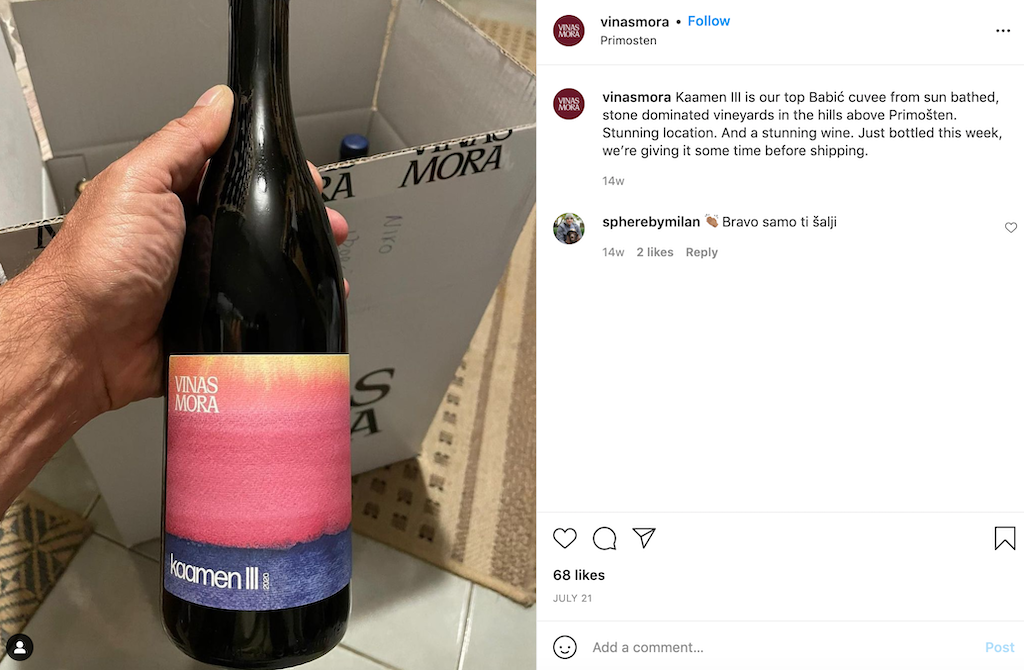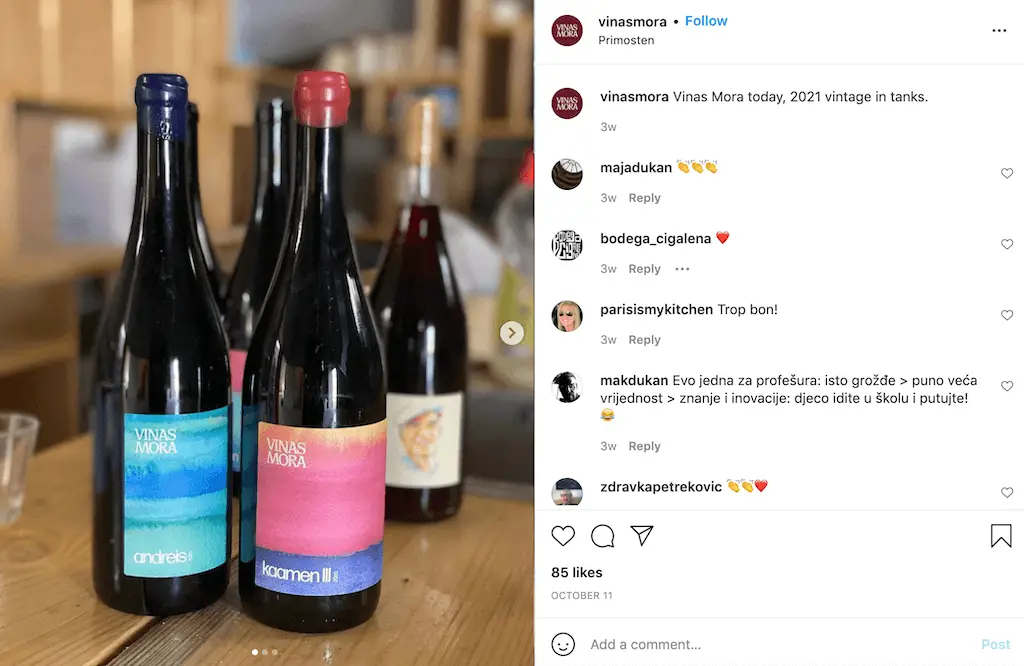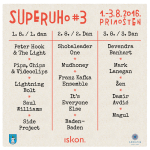In the music world, you may be familiar with the term ‘supergroup’, which would be roughly defined as a band composed of already proven musicians who have world-renowned careers. There are numerous examples where heavyweights have come together under a common denominator: Dave Grohl of Foo Fighters and Josh Homme of Queens Of The Stone Age in Them Crooked Vultures, Mick Jagger, Joss Stone, and others in Super Heavy, or the inevitable Audioslave which is actually Rage Against The Machine with Chris Cornell of Soundgarden on vocals instead of Zack de la Roche, reports Jutarnji List.
A Croatian wine supergroup was formed in Primošten, called Vinas Mora. It is the joint project of Krešo Petreković, who works for the best importer of natural wines in America based in New York, Niko Đukan, and partly Marko Kovač – organizer of the phenomenal natural wine festival in Vienna and distributor for Brazil, France, and Asia. An essential member of their team is Neno Marinov, a local winemaker from Primošten known for his famous grandmother.
“It’s a phenomenal story of how I beat Marinov,” Krešo Petreković begins with an anecdote. “I have been coming to Primošten forever, even when I started working a lot with the American market. I once came across a genius babić placed in plastic bottles, of course without a label, and I struggled until I found out that it was Neno Marinov’s.
When I came to his cellar, I immediately realized that the man knew what he was doing and, without any doubt, immediately suggested that we export his babić to America. At first, he didn’t believe me, but he couldn’t come to his senses when the first order arrived. So we made the labels in London,” Petreković reveals the beginning of the friendship, and later the business cooperation.
Although one might think that Vinas Mora is another in a series of babić editions, this time a bit made-up, but with a good designer label, the matter is still more complex. The initial idea was to present the terroir through wine by buying vineyards from spectacular but hard-to-reach positions. The winery makes five completely natural cuvées, and the most exciting thing is that all wines have the same vinification, but the terroir makes the difference. So, the grapes are picked by hand, mixed in small barrels, then pressed and put in PVC tanks, macerated for only four days, and 25 percent goes into barrels. Sulfur is applied only at the beginning for protection. The main goal was to keep the primary aroma and make the somewhat wild and lively babić elegant, which was served by aging it in wood.
“I think that if you lose or cover those primary aromas in wine production, you made a mistake. Cherry is dominant here, after the immortelle, in fact, the Mediterranean,” says Petreković.

“The basic cuvée is Barbba, a blend of lasina, plavina, debit and maraština from Šibenik-Knin County, more precisely around Šibenska Dubrava to Oklaj. When we tasted it, we were almost instantly overwhelmed by the honey-floral flair with quite pronounced acids. If you had to describe it in two words, you wouldn’t be wrong to call Barbba a “Dalmatian cviček,” the kind you just invented on the terrace by drinking another glass in the thick shade.
Then there is Kaamen 1 – a stylized name that reminds of the region from which the grapes come. These are the vineyards of the Šibenik hinterland, Blizina, Bristivica, and Vinovac. With the first sip of this wine, you will encounter the strong aroma of cherries, which is an example of this “preservation” of primary aromas. Kaamen 2 is also a pure babić, just like Kaamen 1, but in slightly higher positions, like Kruševo and Široki. This is a more potent wine compared to Kaamen 2, and notes of cherry and jam characterize it.”

According to Krešo, Kaamen 3 should welcome us with an even more concrete and powerful character since it is a grape from high locations such as the former Kamena Suza. It is a vineyard for which it is unbelievable that anyone would plant anything there, let alone succeed. Imagine vines growing from stone that must be broken by hand, vines have to be watered by hand, and no new age mechanization in such terrain can make your job easier. The last Andreis was made from grapes from the Primošten area, mainly from the Jadrtovac location.

The whole project started during the pandemic; the first harvest was in 2020. First, they founded the agricultural cooperative Motika, took over the former cellar of Šibenik’s Vinoplod, and bought about 60 tons of babić and other native varieties from local winegrowers. Then, without equipment, any chemical interventions, they crushed grapes day and night with their hands, so these five cuvées, with the common denominator Vinas Mora, were created.
This wine supergroup has already presented new wines to its customers, and the reactions are very positive. Exports to America, Brazil, Switzerland, and Spain have already been agreed upon, and the Netherlands immediately ordered two trucks to Rotterdam as soon as they tasted the wine. These wines are primarily intended for export precisely because of their recognizability and terroir, making them different from anything else. If you were to conjure up the Šibenik or Primošten region without words, to a wine connoisseur from America or Brazil, just with the help of wine, this would be a good choice. The spectacular images of vineyards, historical sketches, food, and dishes of this area are later put together like a puzzle until the whole picture persuades you to visit and get to know this small country with huge potential. Trends are changing, and people like to get to know an area through food and wine, and that is why it must be tremendous and recognizable. Local recipes integrated into the cultural heritage and native wine varieties from which good, drinkable, and elegant wines have been created are the keys to the success of Croatian enogastronomy.
In Croatia, these wines can be purchased at the Agricultural Cooperative Motika, which will soon open to the public.
For more, make sure to check out our dedicated lifestyle section.










